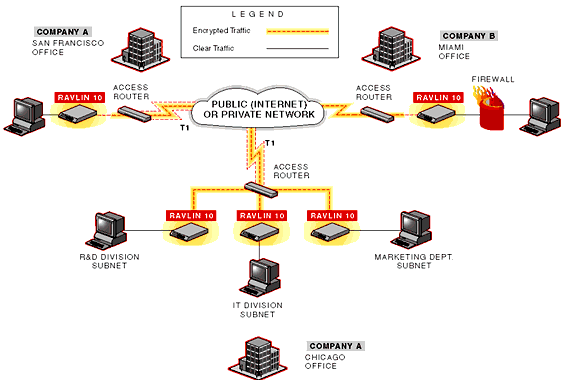
Wireline Performance Encryption Speeds for Ethernet Networks
Wireline Performance is Maintained Through the Use of RedCreek's CryptoCore™ Technology.
The RedCreek Ravlin 10 is a cost-effective network security solution that performs encryption and decryption with a throughput of the theoretical maximum of Ethernet (or "wire" speed). Network administrators use it to establish private communications within secure intranets (between corporate divisions, workgroups, branch offices, and individuals) or within secure extranets (between customers, suppliers, and strategic partners.) Its low cost allows organizations to establish security over private or public IP networks quickly and easily.
The Ravlin 10 provides data privacy using industry-standard 40-bit/56-bit DES and 168-bit Triple DES encryption. Authentication and access control are provided using DSS (Digital Signature Standard), Diffe-Hellman key exchange, X.509 v.3 digital certificates, and ISAKMP/Oakley key management. These security standards are part of the Internet Engineering Task Force (IETF) IP Security Standard (IPSec). The Ravlin 10 maintains the theoretical maximum of Ethernet (or "wire" speed) through the use of RedCreek CryptoCore™ technology.
The Ravlin 10 supports RavlinSoft Clients running on Windows® 95, Windows NT® 4.0, and Windows for Workgroups 3.11 systems, allowing remote communications over public and private networks. Organizations can also purchase enhanced firmware to allow strong RADIUS user authentication for standard remote software. Ravlin RADIUS Authentication provides interoperability with user authentication hardware tokens that have standard RADIUS interfaces. The Ravlin 10 firmware has all mandatory components of the Internet Engineering Task Force (IETF) IP Security Standard (IPSec) for enhanced network security.

Features and Benefits
IPSec Security Standard (IPSec)
ESP (Encapsulated Security Protocol) Tunnel Mode
ESP (Encapsulated Security Protocol) Transport Mode
Encrypt-in-Place (EIP) Mode
Anti-Replay Service and Use of Unique X.509 v.3 Certificates
Fast Encryption: Wireline Performance/No Network Degradation
Ease of Implementation and Administration
Standards-Based Security/Management
Interoperability
Low Cost of Ownership
Customer Support/Service
IP Security Standard (IPSec)
IPSec is the most secure and comprehensive standard available today for encryption, authentication, key management, and anti-replay services.
IPSec protocol interoperability lets Ravlin products exchange keys and encrypted communications with all other IPSec-compliant products, so customers can use different IPSec vendors for multiple scenarios. RedCreek can provide a list of IPSec interoperability partners upon request.
The Ravlin 10 firmware supports the strongest suite of IPSec network security enforcement features available today. Using RavlinNodeManager, the Ravlin 10 firmware gives the network administrator or security manager a choice of several secure VPN operational modes.
ESP (Encapsulated Security Protocol) Tunnel Mode
ESP Tunnel mode provides the highest level of security between gateways. The original IP datagram is encapsulated in a new IP packet using a new IP address as the source/destination of the packet. ESP Tunnel mode uses 40-bit/56-bit DES or 168-bit Triple DES encryption.
ESP (Encapsulated Security Protocol) Transport Mode
In ESP Transport mode, only the payload of the original IP datagram is encrypted. Like ESP Tunnel mode, ESP Transport mode uses 40-bit/56-bit DES or 168-bit Triple DES. Ravlin 10 units also support Authentication Header (AH) Transport mode and Authentication Header (AH) Tunnel mode, which use strong authentication and anti-replay to secure IP datagrams without encrypting the data payload. ESP Transport mode uses hashing methods to ensure that the data stream is not modified.
Encrypt-in-Place (EIP) Mode
In EIP mode, only the payloads of IP datagrams are encrypted. Like ESP mode, EIP mode can use 40-bit/56-bit DES or 168-bit Triple DES. EIP mode is a RedCreek proprietary secure VPN technology. Although EIP mode is not part of the IPSec standard, it combines high speed with all levels of encryption.
Anti-Replay Service and Use of Unique X .509 v .3 Certificates
Ravlin 10 uses IPSec anti-replay services to ensure that rogue packets cannot be inserted into a Ravlin-protected data stream. With anti-replay service, each IP datagram passing within the secure association is tagged with a sequence number. On the receiving end, the datagram is blocked if its sequence number does not fall within a pre-specified range of sequence numbers.
Return to top
Fast Encryption: Wireline Performance without Network Degradation
- Third-party tested and validated at encryption/decryption speeds of 100% of media throughput for all packet sizes.
Ease of Implementation and Administration
- Integrates easily into existing networks through 10BaseT inputs and outputs.
- Secure download of product upgrades to Ravlin 10 flash memory.
- Easy device management through industry-standard SNMP MIB II.
- Automatically configures to operate in an IP network through Dynamic Host Configuration Protocol (DHCP).
Standards-Based Security/Management
- Complies with the security standards being developed by the Internet Engineering Task Force (IETF) IP Security (IPSec) Working Group.
- Ensures information privacy using full 40- and 56-bit DES (Data Encryption Standard) and 168-bit Triple DES.
- Provides access control through the use of International Standards Organization (ISO) X.509 v.3 digital certificates.
- Verifies the sender’s identity with Digital Signature Standard (DSS) and Secure HMAC-MD5 and HMAC-SHA-1 Hash Algorithm (SHA) protocols.
- Establishes and maintains secure communications using the Internet Security Association and Key Management Protocol (ISAKMP) v.9/Oakley.
- Provides enhanced confidentiality to IP datagrams through the IP Encapsulating Security Payload (IPESP) Tunneling Mode protocol.
- Uses industry-standard SNMP MIB II for device management.
- Provides support for the following protocols:
- Transmission Control Protocol/Internet Protocol (TCP/IP)
- User Datagram Protocol (UDP)
- Dynamic Host Configuration Protocol (DHCP)
- Internet Control Message Protocol (ICMP) Ping
- Address Resolution Protocol (ARP)
- Simple Network Management Protocol (SNMP)
- RADIUS support with optional firmware at additional cost
Interoperability
- ISAKMP/Oakley for key management
- Encapsulated Tunneling (IPSec IPESP) for interoperability with firewalls
- Standard 10BaseT inputs and outputs to drop into any Ethernet network
- Operates at ISO Network layer 3, making it application independent
Return to top
Low Cost of Ownership
- Preserves investments in existing network hardware and software by dropping transparently into the network without requiring modification to the existing network infrastructure.
- Delivers best price and performance for network security products.
- Allows significant network cost savings by ensuring secure communications and data privacy over public networks like the Internet.
Return to top
Ravlin 10 Technical Specifications
|
|

Throughput
|
The theoretical maximum of Ethernet (or "wire" speed) |

Dimensions
|

1.75” H x 11” D x 8.75” W
4.45 cm H x 27.94 cm D x 21.59 cm W
(Two Ravlin 10s fit side by side on a standard IU 19-inch rack shelf.)
|

Weight |

2 lb. 3 oz. / 1.0 kg |

LAN Interface |

Two 10BaseT or RS-232 AUI Ethernet ports per device |

Management Interfaces |

Front panel, 10BaseT Ethernet, RS-232 |

Firmware Upgrades |

Download to flash via RavlinNodeManager |

Power Requirements |

DC power—9- to 14-volt power supply at 1 amp.
For use in a 110-120 VAC, 60-cycle unconditioned power environment. An international power supply is available.
|

Options |

Remote Access Feature |

Safety Certification |

CE |

Tamper Evident Status |

FIPSs 140-1, level 2 |

EMI/RFI |

CISPR EN 55022B |
Return to top

|







